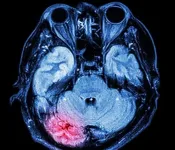Dapagliflozin provides kidney protection even in cases of FSGS kidney disease
The progressive loss of renal function in focal segmental glomerulosclerosis (FSGS) was reduced by half in the DAPA-CKD study
2021-06-07
(Press-News.org) Focal segmental glomerulosclerosis (FSGS) is a rare form of kidney inflammation (glomerulonephritis) in which the glomeruli become increasingly scarred (sclerotic), leading to progressive loss of kidney function. Dysregulation of the immune system plays a role in pathogenesis, which is why immunosuppressive therapy with glucocorticoids can be successful, alongside supportive therapy (especially blocking of the renin-angiotensin system with ACE inhibitors or angiotensin receptor blockers). Many patients nevertheless require dialysis in the course of the disease. New therapeutic approaches that stabilize or protect kidney function are therefore needed.
In patients with type 2 diabetes, who often have concomitant kidney damage, treatment with an oral antidiabetic agent from the group of SGLT2 inhibitors (gliflozins) results in stabilization of renal function and improvement of clinical (renal and cardiovascular) outcomes. These medications inhibit SGLT-2 (sodium-dependent glucose co-transporter 2) in the proximal renal tubule, thereby increasing urinary glucose excretion. The DAPA-CKD study showed that the SGLT2 inhibitor dapagliflozin markedly reduces the risk of progressive loss of renal function in patients with chronic kidney disease (CKD), both in the presence and in the absence of diabetes mellitus [1].
A pre-specified subgroup analysis specifically investigated safety and efficacy in study patients with FSGS [2]. The trial included 115 participants with FSGS randomized to receive either 10 mg dapagliflozin (n=53) or placebo (n=62) on top of standard treatment. The combined primary endpoint included a ?50% decrease in eGFR, reaching dialysis requirement, or cardiovascular death. In the present analysis, the course of kidney function (eGFR) was specifically investigated during the median 2.4-year follow-up. The FSGS patients were 53.7±13.9 years old, had a glomerular filtration rate (eGFR) of 41.6±11.6 ml/min/1.73 m2 and a median urinary protein excretion of 1553 (758-2257) mg/g.
The results showed that four out of 53 patients on dapagliflozin (7.5%) and nine out of 62 patients on placebo (14.5%) reached the primary endpoint (HR 0.54). In the first two weeks after the start of the study, the familiar phenomenon of initial eGFR decline occurred (eGFR dip of -4.5 ml/min/1.73m2 in the dapagliflozin group compared to -0.8 ml/min/1.73m2 in the placebo group). Over the remainder of the study, the annual eGFR loss was -1.9 versus -4.2 ml/min/1.73 m2. Tolerability and safety of dapagliflozin were good, and discontinuations due to side effects were similar in both groups.
The results of several previous studies have demonstrated that SGLT2 inhibitors improve cardiovascular and kidney outcomes in patients with type 2 diabetes. We know that for dapagliflozin, these benefits extend to patients with heart failure and chronic kidney disease who do not have diabetes. New data from this subgroup analysis suggest that FSGS patients also gain benefit,' said Professor David Wheeler.
'SGLT2 inhibitors offer a promising new therapeutic option in the field of nephrology and are likely to be used more extensively in future, both in diabetic and non-diabetic kidney diseases. Not only do these agents slow progression of kidney disease, but they also reduce the risk of cardiovascular diseases, which are important comorbidities in this patient population.'
INFORMATION:
[1] Wheeler DC, Stefánsson BV, Jongs N et al. Effects of dapagliflozin on major adverse kidney and cardiovascular events in patients with diabetic and non-diabetic chronic kidney disease: a prespecified analysis from the DAPA-CKD trial. Lancet Diabetes Endocrinol 2021; 9 (1):22-31
[2] 2479 David Wheeler, London. Effects of Dapagliflozin on major adverse kidney events in patients with focal segmental glomerulosclerosis: a prespecified analysis of the DAPA-CKD trial.
About ERA-EDTA
With more than 7,000 active members, the ERA-EDTA is one of the biggest nephrology associations worldwide leading European nephrology and one of the most important European Medical Associations. It organizes annual congresses and other educational and scientific activities. ERA-EDTA also collects data, and performs epidemiological studies through its Registry. The Society supports fellowships and educational/research projects through its committees and working groups. Its publications are NDT, CKJ (Open Access journal), and the online educational portal NEP.
The 59th Congress will take place in May 19-22, 2022, both virtual and live in Paris (France).
Website: http://www.era-edta.org
ELSE PRESS RELEASES FROM THIS DATE:
2021-06-07
Accumulation of water in the lungs (lungcongestion) is a common condition in hemodialysis patients, particularly in those at high cardiovascular risk, like those presenting coronary artery disease and/or heart failure. This alteration can be detected in an X-ray image, but cannot be heard easily with a stethoscope. When the congestion becomes so severe that fluid floods the alveoli ('alveolar pulmonary edema'), the sound of rattling breathing can be heard (and without a stethoscope at a later stage). Then, at the latest, pulmonary gas exchange is severely impaired, and the patients experience shortness of breath or even fear of death.
For hemodialysis patients, ...
2021-06-07
The battle against antibiotic-resistant bacteria: A new study at Tel Aviv University revealed a mechanism through which "good" viruses can attack the systems of "bad" bacteria, destroy them and block their reproduction. The researchers demonstrated that the "good" virus (bacteriophage) is able to block the replication mechanism of the bacteria's DNA without damaging its own, and note that the ability to distinguish between oneself and others is crucial in nature. They explain that their discovery reveals one more fascinating aspect of the mutual relations between bacteria and bacteriophages and may ...
2021-06-07
IgA nephropathy (IgAN) is a chronic kidney disease occurring in young adults and is one of the most common reasons for kidney transplantation in this age group. IgAN is the most common form of glomerulonephritis (GN), i.e., immunologically induced inflammation of the renal glomeruli. It is characterized by glomerular deposition of immune complexes containing immunoglobulin A (IgA), and by a complex inflammatory response and progressive loss of kidney function. For many decades, IgAN has therefore been treated with anti-inflammatory or strong immunosuppressive agents. ...
2021-06-07
Wider clean chemistry applications of the extraordinary Vortex Fluidic Device - invented by Flinders University's Professor Colin Raston - are likely in the wake of new research that has been published outlining the seemingly endless possible uses.
The defining paper on understanding fluid flow in the Vortex Fluidic Device has just been comprehensively explained in an article published in Nanoscale Advances (DOI: 10.1039/D1NA00195G).
This took more than 100,000 experiments to work out - and Professor Raston hopes this publication will encourage more researchers to embrace the VFD and explore yet more innovative applications for this ingenious device.
"How fluid flows is one of the grand challenges of science," says Professor Raston. "What we have been ...
2021-06-07
A world-first international study led by the University of South Australia has identified a new drug to stop athletes developing dementia after sustaining repeated head injuries in their career.
The link between concussion and neurogenerative diseases is well established, but new research findings could halt the progression of chronic traumatic encephalopathy (CTE) in sportspeople who sustain repeated blows to the head.
CTE is a progressive and fatal brain disease associated with the accumulation of a protein known as hyperphosphorylated tau which affects cognition and behaviour.
In a paper published in Scientific Reports, ...
2021-06-07
LA JOLLA, CALIF. - June 7, 2021 - A preclinical study led by scientists at Sanford Burnham Prebys has established that AAV8-TNAP-D10--a gene therapy that replaces a key enzyme found in bone--may be a safe and effective single-dose treatment for hypophosphatasia (HPP). The study, published in the Journal of Bone and Mineral Research and performed in a murine model of the disease, further supports advancing the therapy toward human clinical trials.
"This is the most promising gene therapy study to date demonstrating a successful increase in life span, and improvement ...
2021-06-07
Monash University researchers have provided a fundamental advance regarding how T cells become activated when encountering pathogens such as viruses.
The recent study published in Science, co-led by Professor Nicole La Gruta, Professor Jamie Rossjohn and Professor Stephanie Gras with first author Dr Pirooz Zareie from the Monash Biomedicine Discovery Institute, have found that T Cells need to recognise pathogens in a particular orientation in order to receive a strong activating signal.
T cells play a key role in the immune system by eliminating invading pathogens, such as viruses, and it is crucial to understand ...
2021-06-07
When we inhale isolated coronavirus particles, more than 65% reach the deepest region of our lungs where damage to cells can lead to low blood oxygen levels, new research has discovered, and more of these aerosols reach the right lung than the left.
Lead author of the study Dr Saidul Islam, from the University of Technology Sydney, said while previous research has revealed how virus aerosols travel through the upper airways including the nose, mouth and throat - this study was the first to examine how they flow through the lower lungs.
"Our ...
2021-06-07
Finding the hypothetical particle axion could mean finding out for the first time what happened in the Universe a second after the Big Bang, suggests a new study published in Physical Review D on June 7.
How far back into the Universe's past can we look today? In the electromagnetic spectrum, observations of the Cosmic Microwave Background -- commonly referred to as the CMB -- allow us to see back almost 14 billion years to when the Universe cooled sufficiently for protons and electrons to combine and form neutral hydrogen. The CMB has taught us an inordinate amount about the evolution of the cosmos, but photons in the CMB were released 400,000 years after the Big Bang making it extremely challenging to learn about the history of ...
2021-06-07
TAMPA, Fla. (June 4, 2021) — Type 1 diabetes (T1D) is an autoimmune disease in which a misdirected immune system gradually destroys healthy pancreatic islet β cells, resulting in a lack of insulin. The exact cause of T1D remains unknown. However, β cell-reactive autoantibodies can be detected in circulating blood months to years before diagnosis, raising the possibility of intervening to stop or delay T1D before children develop the disease.
Monitoring the number, type, and concentration of autoantibodies appearing in the blood can help predict the long-term risk of progression from autoimmunity to symptomatic T1D.
Now new findings suggest that measuring how patterns ...
LAST 30 PRESS RELEASES:
[Press-News.org] Dapagliflozin provides kidney protection even in cases of FSGS kidney disease
The progressive loss of renal function in focal segmental glomerulosclerosis (FSGS) was reduced by half in the DAPA-CKD study





